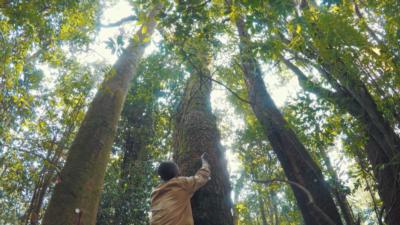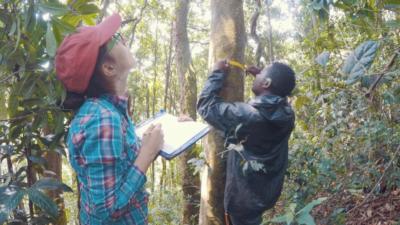The Chr. Michelsen prize awarded to Aida Cuni-Sanchez
Aida Cuni-Sanchez has been awarded the Chr. Michelsen prize for outstanding development research for her article ‘High aboveground carbon stock of African tropical montane forests’. The article was published in the prestigious journal Nature in August 2021.
The work leading up to the article is an international team effort and field work spanning over several years. A team of 101 researchers measured 72, 336 trees in the mountains in 12 African countries. The trees gave them surprising answers that hold important lessons for conservation efforts.
-We found that montane forests in Africa have much higher carbon stocks than previously assumed. We also found that they are being deforested faster than in the lowlands, so we should improve conservation efforts there. Carbon finance mechanisms to avoid deforestation could be an option, but of course this should be implemented in a way that poor ‘forest-edge communities’ benefit from. A different important point is that if such forests can store so much carbon, we should invest more in their restoration. This would be a far more effective measure than planting trees in dry areas. But of course, restoration cannot replace efforts to avoid deforestation altogether. Tropical forests take a long time to grow back, especially the bigger trees that are the most effective at storing carbon, says Dr Cuni-Sanchez, associate professor at Noragric, NMBU.

A researcher marks the point of tree diameter measurement in Itombwe Nature Reserve, Democratic Republic of the Congo. Adding tree tags and paint allows for precise monitoring of tree growth over time. Photo provided by A. Cuni-Sanchez.
Tropical forests are crucial for stabilizing global warming
Many countries have provided funding for programmes targeted at limiting deforestation. For many years, Norway has been the main contributor to REDD+, the United Nations programme designed for reducing emissions due to deforestation and forest degradation. Have these programmes been successful? Cuni-Sanchez stresses that her research does not assess the efficiency of specific climate-forest initiatives. She also points to the sometimes mixed outcomes of such programmes. In some cases, the ’forest-edge communities’ suffer disproportionately as they are excluded from using the forests – even if e.g. harvesting medicinal plants or edible caterpillars might have no negative effects on carbon stocks, and as they receive no income from carbon project – it all gets consumed by other stakeholders at different political levels, sometimes, including local elites.
As a researcher working at the intersection between natural and social sciences – her fascination for the interplay between forests and the people who live on their borders (or within) started when she as an undergraduate student got a scholarship to travel to Madagascar – she is an advocate for a wider approach to conservation efforts. If efforts to counteract deforestation and forest degradation fail to consider the impacts on people who live there, they are simply not good enough.
Still, when it comes to reducing carbon emissions few measures can match the efficiency of targeted programmes aimed at stopping deforestation.
-We know that avoiding deforestation and forest degradation is crucial for stabilizing global warming to below the 2° C target of the Paris Climate agreement, so we should continue to invest in climate-forest initiatives.

Montane forests play a bigger role than previously thought
Cuni-Sanchez firmly believes that change comes from establishing partnerships. She engages in talks with for example Norad, the Rainforest Foundation, WCS, WWF and other stakeholders, including companies that are involved in the carbon market.
She feels there is a general understanding of the crucial role forests play in combatting climate change. But perhaps it isn’t good enough?
-There is a lack of understanding, and data, on a more detailed level. For example, we do not know what happens in montane or swamp forests, or in the tropical soils. If you compare our understanding of temperate and boreal forests – species poor and structurally simpler – to the tropical megadiverse structurally complex forests – far less researched – there is a huge knowledge gap.
What we do know for certain though is that effect of the montane forests having higher carbon stocks than assumed is dramatic. During their research, the international team calculated how much tropical forest had been lost in the African continent over the past 20 years using satellite data. According to their estimates, 0.8 million hectares had been lost. These 0.8 million hectares have emitted more than 450 million tonnes of carbon dioxide, hence playing an even bigger role in contributing to global warming than previously thought.
Cuni-Sanchez is currently working on a paper on the carbon stock in swamp forests in DR Congo, and hopes to continue doing research that can contribute to filling the knowledge gaps. But tackling climate change is not a task researchers can take on their own.
-The continued deforestation we are witnessing is not first and foremost a question of lack of ecological knowledge. There is a complex socio-cultural, political and economic context that we have to understand and address, she says.
-We only have one planet, and our lives depend on our ability to protect its climate.
Facts:
- The Chr. Michelsen prize for outstanding development research aims to promote and inspire development related research of high quality and relevance. The prize is awarded to a researcher below 40 years of age for an outstanding peer reviewed article.
- The prize is awarded biannually. Previous winners are Vincent Somville (2020), Maja Janmyr (2018), Francesca R. Jensenius (2016) and Carl Henrik Knutsen (2014).
- This is the first time the Chr. Michelsen prize has been awarded to a primarily natural science article. In the justification for this year’s award the prize committee points to the relevance of natural sciences in development research.
- The justification for the award pays tribute to the important role Cuni-Sanchez has as founder and coordinator of the AfriMont network. ‘Literally hundreds of researchers and technicians have for years been measuring trees across African montane forests. By bringing these people and their data together, Cuni-Sanchez and the network enabled a publication in perhaps the most prestigious scientific journal, Nature. As such the prize is also a tribute to the coordination by the winner and the teamwork within AfriMont.’
- Dr Cuni-Sanchez and the AfriMont Team have agreed to give the funds from the prize to a female PhD student in Cameroon to help her re-measure some of the AfriMont plots and use such data to complete her PhD degree. To date, few African female scientists engage in forest research.